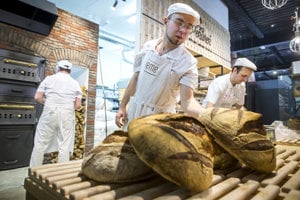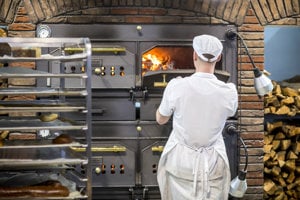The development of the free market in Slovakia has led to gradual changes in the dietary preferences of Slovak consumers. As grocery stores have responded to them with several supply and structure adjustments and a notable reduction of their sales areas, the changes have also opened the market for new, small customer-focused stores.
In the 2000s, the Slovak retail industry got through the reformation when many small local stores got new owners and large multinational companies with a great selection of goods across a large area entered the market. On the contrary, customers are again beginning to feel the need for more frequent and small purchases, and so small, local concepts are slowly returning. A stage of a certain balance in the retail industry is coming, according to Ľubomír Drahovský, market analyst with the Terno market survey agency.
“In retail, we are coming back to the logic of full spectrum buying and selling,” Drahovský told The Slovak Spectator.
The current growth in the number of small grocery stores is proof of the changes in food preferences, however, they are still only an additional local form of sales, Drahovský said.
As Bratislava offers the biggest market for local grocery stores aimed at the customer’s specific needs, most of the new concepts open branches there. One of them, Malina, now owns 12 branches in the city and plans to open at least three more stores, the Hospodárske Noviny daily reported.
Delia, owned by financial group Arca Capital, is developing even faster, currently with 26 branches in Bratislava and stores under construction in the new residential areas Zuckermandel and Perla Ružinova. In addition to the focus on food, the company wants to extend its activities by gas stations.
Successful networks also include Môj Obchod and Fresh. Another local concept, Fajne potraviny has opened its first branch providing baked goods, meat and organic products in the Dargov shopping centre in Košice.
Yeme expands too
In 2016, ex-employees of large retailers Tesco, Billa and Lidl founded a concept of so-called, full of taste grocery store Yeme in the old building of Ikea in Bratislava. Yeme focuses primarily on the sale of high quality local food, although their stores do not lack ordinary products like cream-filled wafers called Horalky or mineral water.
In March 2017, the company opened a second branch on Búdkova Cesta near Horský Park. Co-owner of Yeme Peter Varmuža explained the expansion only in Bratislava because of the home atmosphere and perception of priorities of their customers.
“Best in the middle of residential areas, on larger roads and junctions, with the ability to park, to be easily available for customers,” Varmuža told The Slovak Spectator.
 Supermarket promoting local food expands Read more
Supermarket promoting local food expands Read more Yeme plans to open a third branch in the poly-functional complex Panorama City near the Eurovea shopping centre by the end of 2017.
Similar trends
The same trend of expansion of small grocery stores exists elsewhere in the world. The main reasons include worsening traffic and that people have less time and appreciate moments dedicated to family and hobbies, said Varmuža.
Katarína Paule, Head of Retail Agency at Cushman & Wakefield Slovakia, pointed to a successful grocery network Žabka and increasing demand for small stores in the Czech Republic. The Slovak store Delia is responding to this demand with its plans for opening a branch in Prague in the near future, Hospodárske Noviny wrote.
Drahovský sees differences in the development of small stores in the Visegrad Group (V4) region. Whereas, after changes in the ownership relations, Polish and Hungarian store network remained relatively consistent, the successor states of Czechoslovakia sought to balance of the forms of large and small retail.
“Trade flair in the Czech Republic for many years was more favourable than in Slovakia,” said Drahovský.
Changes in preferences
People in Slovakia has changed their ideas about how and where they buy food. While in the past customers did seven to 10-day shoppings, today many prefer to make purchases every one to two days, said Drahovský.
“We are in a period of logical form of relationships between retail business and customer,” Drahovský said.
 Sale of locally sourced foodstuffs sprouts Read more
Sale of locally sourced foodstuffs sprouts Read more Today’s customers are richer, much more sensitive to time and quality, like local products, organic brands, freshness, and smaller, more frequent purchases, according to Paule. Small shopkeepers try to respond to actual needs, various allergies and intolerance, provide higher quality and a personal approach, while those located in buildings of former dairies provoke a feeling of nostalgia in some people.
“Occasionally they know a customer by name, are able to prepare or order goods in advance, or not allow children to buy forbidden food without parental consent,” said Paule.
Small stores, however, often have higher prices and a smaller selection of individual and perishable products, Paule said.
Hypermarkets are leaving the market
In reaction to the current development, experts see almost absolute departure of hypermarkets from the market. Paule explains that customers have gradually found a much more complex supply of non-food items in the specialised stores, that has led to a reduction of hypermarket sales areas and their gradual leaving from shopping centres.
Odd supermarkets optimise their size too and focus more on better targeting of customers, quality of service and marketing, Paule added.
Bright future
The growth of retail formats will make the business environment more friendly, said Drahovský, however, they will not dominate the market due to its sensitivity to successes and failures, Drahovský said.
Cushman & Wakefield expects an expansion of small stores to new localities where such concepts belong and where they should become successful. The risk remains in the sensibility of the expansion’s extent and an effort to get closer to customers may lead to mutual cannibalisation of stores, said Paule.
“In the longer term, the sector will underlie the impact of e-commerce,” Paule said.






